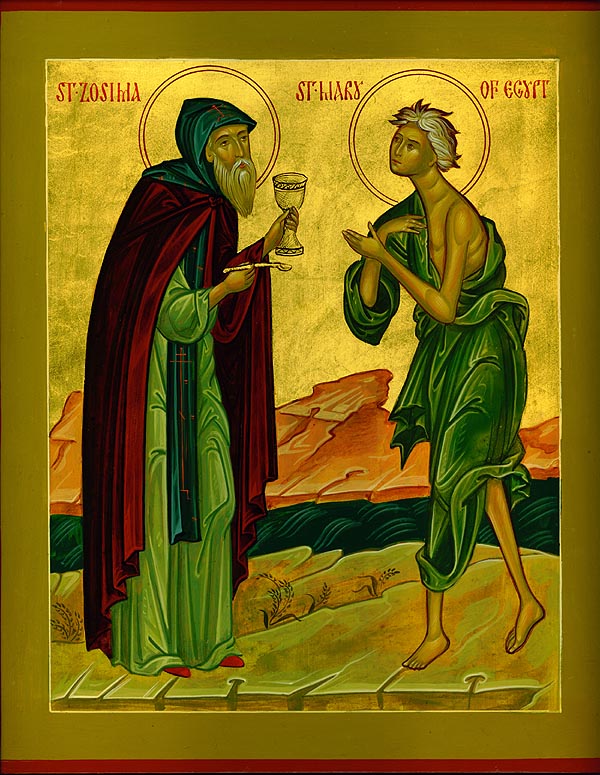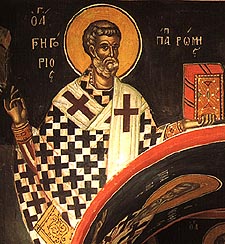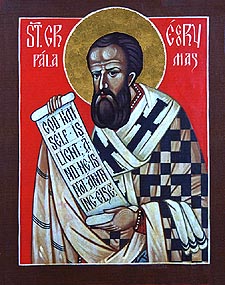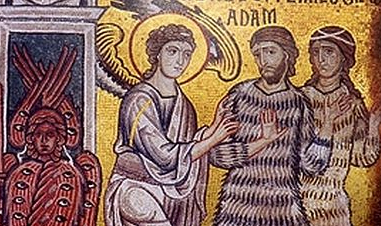The Paschal Service Of The Eastern Orthodox Church
 Enjoy ye all the feast of faith; receive ye all the riches of loving-kindness. (Sermon of St. John Chrysostom, read at Paschal Matins)
Enjoy ye all the feast of faith; receive ye all the riches of loving-kindness. (Sermon of St. John Chrysostom, read at Paschal Matins)
The resurrection of Jesus Christ from the dead is the center of the Christian faith. St. Paul says that if Christ is not raised from the dead, then our preaching and faith are in vain (I Cor. 15:14). Indeed, without the resurrection there would be no Christian preaching or faith. The disciples of Christ would have remained the broken and hopeless band which the Gospel of John describes as being in hiding behind locked doors for fear of the Jews. They went nowhere and preached nothing until they met the risen Christ, the doors being shut (John 20: 19). Then they touched the wounds of the nails and the spear; they ate and drank with Him. The resurrection became the basis of everything they said and did (Acts 2-4): ". . . for a spirit has not flesh and bones as you see that I have" (Luke 24:39).
Venerable Mary of Egypt
 Saint Zosimas (April 4) was a monk at a certain Palestinian monastery on the outskirts of Caesarea. Having dwelt at the monastery since his childhood, he lived there in asceticism until he reached the age of fifty-three. Then he was disturbed by the thought that he had attained perfection, and needed no one to instruct him. “Is there a monk anywhere who can show me some form of asceticism that I have not attained? Is there anyone who has surpassed me in spiritual sobriety and deeds?”
Saint Zosimas (April 4) was a monk at a certain Palestinian monastery on the outskirts of Caesarea. Having dwelt at the monastery since his childhood, he lived there in asceticism until he reached the age of fifty-three. Then he was disturbed by the thought that he had attained perfection, and needed no one to instruct him. “Is there a monk anywhere who can show me some form of asceticism that I have not attained? Is there anyone who has surpassed me in spiritual sobriety and deeds?”
Suddenly, an angel of the Lord appeared to him and said, “Zosimas, you have struggled valiantly, as far as this is in the power of man. However, there is no one who is righteous (Rom 3:10). So that you may know how many other ways lead to salvation, leave your native land, like Abraham from the house of his father (Gen 12:1), and go to the monastery by the Jordan.”
St. Gregory Dialogus, the Pope of Rome
 Saint Gregory Dialogus, Pope of Rome, was born in Rome around the year 540. His grandfather was Pope Felix, and his mother Sylvia (November 4) and aunts Tarsilla and Emiliana were also numbered among the saints by the Roman Church. Having received a most excellent secular education, he attained high government positions.
Saint Gregory Dialogus, Pope of Rome, was born in Rome around the year 540. His grandfather was Pope Felix, and his mother Sylvia (November 4) and aunts Tarsilla and Emiliana were also numbered among the saints by the Roman Church. Having received a most excellent secular education, he attained high government positions.
Leading a God-pleasing life, he yearned for monasticism with all his soul. After the death of his father, Saint Gregory used his inheritance to establish six monasteries. At
St. Gregory Palamas the Archbishop of Thessalonica
 Saint Gregory Palamas, Archbishop of Thessalonica, was born in the year 1296 in Constantinople. Saint Gregory’s father became a prominent dignitary at the court of Andronicus II Paleologos (1282-1328), but he soon died, and Andronicus himself took part in the raising and education of the fatherless boy. Endowed with fine abilities and great diligence, Gregory mastered all the subjects which then comprised the full course of medieval higher education. The emperor hoped that the youth would devote himself to government work. But Gregory, barely twenty years old, withdrew to Mount Athos in the year 1316 (other sources say 1318) and became a novice in the Vatopedi monastery under the guidance of the monastic Elder Saint Nicodemus of Vatopedi (July 11). There he was tonsured and began on the path of asceticism. A year later, the holy Evangelist John the Theologian appeared to him in a vision and promised him his spiritual protection. Gregory’s mother and sisters also became monastics.
Saint Gregory Palamas, Archbishop of Thessalonica, was born in the year 1296 in Constantinople. Saint Gregory’s father became a prominent dignitary at the court of Andronicus II Paleologos (1282-1328), but he soon died, and Andronicus himself took part in the raising and education of the fatherless boy. Endowed with fine abilities and great diligence, Gregory mastered all the subjects which then comprised the full course of medieval higher education. The emperor hoped that the youth would devote himself to government work. But Gregory, barely twenty years old, withdrew to Mount Athos in the year 1316 (other sources say 1318) and became a novice in the Vatopedi monastery under the guidance of the monastic Elder Saint Nicodemus of Vatopedi (July 11). There he was tonsured and began on the path of asceticism. A year later, the holy Evangelist John the Theologian appeared to him in a vision and promised him his spiritual protection. Gregory’s mother and sisters also became monastics.
A Sermon for Forgiveness Sunday
 In the Name of the Father, and of the Son, and of the Holy Spirit!
In the Name of the Father, and of the Son, and of the Holy Spirit!
“Forgive me…” Such easy, simple words! It doesn’t even take a deep breath to say them. It took mankind so many generations, tears, sins and so much suffering to respond to the call for repentance by the Holy Prophet and Forerunner John, the Baptist of the Lord, with the words: “Forgive me, O Lord!” and enter the waters of the Jordan.

